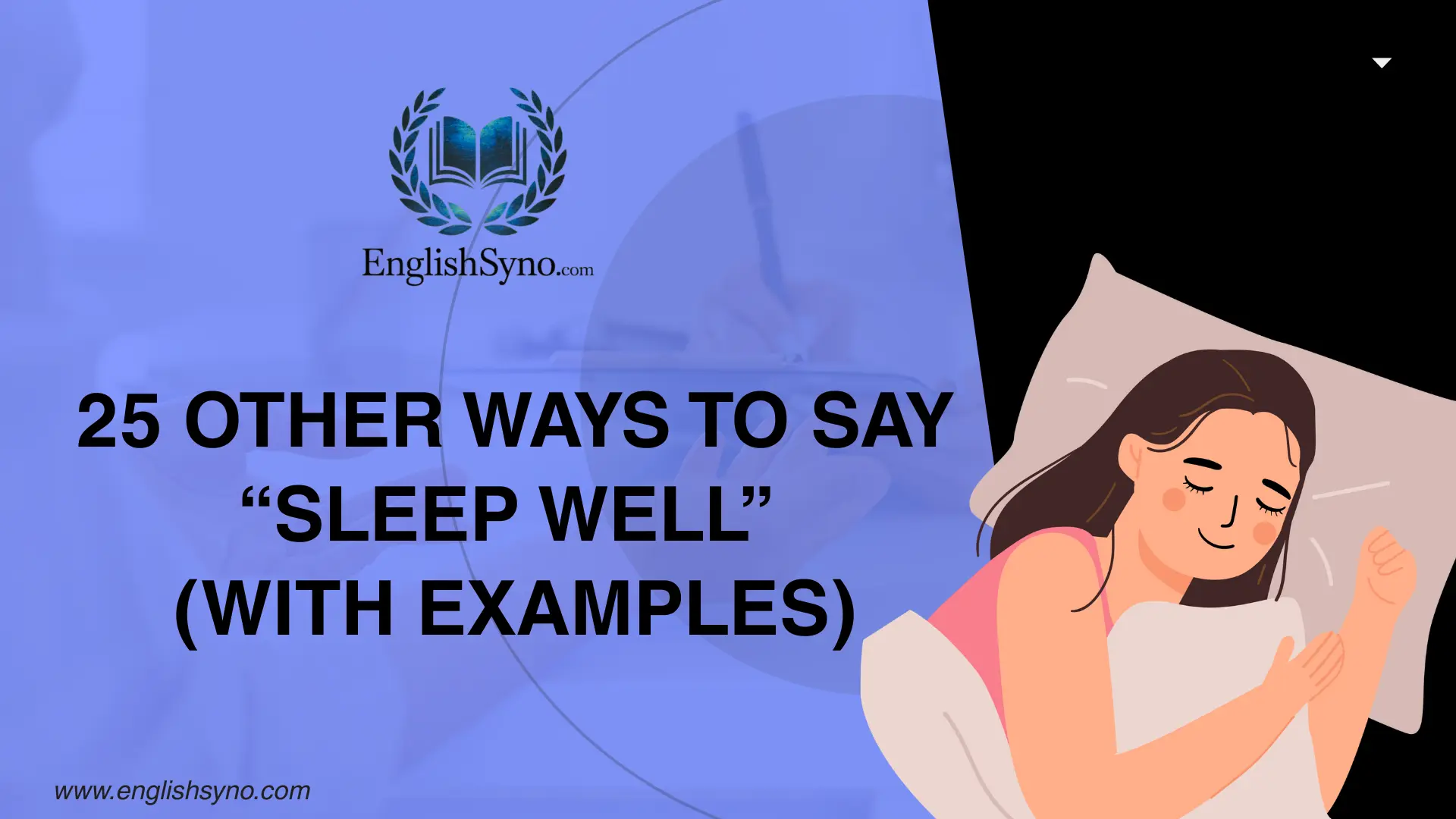When I think about how to sleep soundly, I remember nights when I felt completely at ease, sleeping deeply and peacefully, without waking even once. It’s amazing how a good night’s rest can change everything and help us sleep well through the night. Sometimes, I fall fast asleep, almost like a log or a rock, and wake feeling new again. Others describe it as sleeping like a baby or even a dormouse, lost in gentle repose – timeless phrases and idioms that capture what it means to be truly in deep rest.
When stress hits, I often wish I could sleep very well, to rest quietly and placidly, free from thoughts heavily pressing on my mind. Sometimes, I try to catch forty winks, a quick nap that feels informal yet helps more than expected. I’ve even joked about sleeping like a dog, or being out cold, completely worn, and deeply calm. To sleep tightly has become my small good goal, a nightly wish to simply be calm and asleep.
What Does “Sleep Well” Mean?
“Sleep well” is a common phrase used to wish someone a peaceful and restful night’s sleep. It conveys care, affection, and concern for a person’s comfort and health. When you say “sleep well,” you’re essentially saying, “I hope you have a night of good rest and wake refreshed.” It’s a simple yet powerful way to express love, empathy, or professionalism, depending on context.
When to Use “Sleep Well”
Use “sleep well” in the evening or before bedtime, especially when ending a conversation, text, or call. It suits both personal and professional settings, depending on your tone. You can use it with friends, partners, coworkers, or family to wish them a relaxing night and show that you care about their well-being.
Is It Professional/Polite to Say “Sleep Well”?
Yes, “sleep well” is polite, kind, and universally appropriate. It can be used in both personal and professional conversations. In business emails, you might want to use it sparingly, opting for a tone that suits your relationship with the recipient. For instance, saying, “Hope you get some rest tonight,” may sound more natural in professional contexts.
Pros or Cons
Pros:
- Shows care and thoughtfulness.
- Universally understood and appropriate.
- Works in both casual and professional contexts.
Cons:
- It can sound too routine or impersonal if overused.
- May lack emotional depth if not personalized.
Sleep Tight
Meaning: A comforting way to wish someone a cozy, uninterrupted sleep.
Explanation: Originates from old-fashioned beds that needed tightening for comfort.
Best Use: With friends, family, or romantic partners.
Worst Use: In formal or business emails.
Tone: Warm, affectionate, informal.
Sweet Dreams
Meaning: A loving wish that someone dreams of pleasant things.
Explanation: Often used between loved ones before bed.
Best Use: Romantic or family contexts.
Worst Use: Formal communication.
Tone: Tender, caring, affectionate.
Rest Easy
Meaning: A phrase that encourages relaxation and comfort.
Explanation: Suggests letting go of worries before sleeping.
Best Use: When someone is stressed or anxious.
Worst Use: Very formal or business messages.
Tone: Calm, reassuring, supportive.
Have a Good Night’s Rest
Meaning: A polite and thoughtful variation of “sleep well.”
Explanation: Emphasizes full rejuvenation after rest.
Best Use: Personal and semi-professional emails.
Worst Use: Very brief text exchanges.
Tone: Polite, neutral, warm.
Dream Sweetly
Meaning: A poetic and loving wish for gentle dreams.
Explanation: Often used in romantic or family settings.
Best Use: With close loved ones.
Worst Use: Business conversations.
Tone: Poetic, affectionate, soft.
Rest Peacefully
Meaning: Encourages calm and uninterrupted rest.
Explanation: Similar to “sleep peacefully,” but more serene.
Best Use: When offering comfort or sympathy.
Worst Use: Overly casual chats.
Tone: Gentle, empathetic, soothing.
Catch Some Z’s
Meaning: A fun, informal way to say “get some sleep.”
Explanation: Derived from cartoons showing “Zzz” for sleeping.
Best Use: Friendly, casual conversations.
Worst Use: Professional or formal messages.
Tone: Playful, lighthearted.
Have a Restful Night
Meaning: Encourages relaxation and comfort throughout the night.
Explanation: Best for showing thoughtful care.
Best Use: Personal or semi-professional emails.
Worst Use: Brief, chatty texts.
Tone: Kind, sincere, caring.
Drift Off Gently
Meaning: Suggests falling asleep smoothly and peacefully.
Explanation: Implies a natural, undisturbed transition into sleep.
Best Use: Romantic or friendly contexts.
Worst Use: Workplace chats.
Tone: Tender, gentle, poetic.
Sleep Peacefully
Meaning: Wishes someone total calm and rest.
Explanation: Ideal for emotional or tender moments.
Best Use: To comfort someone tired or unwell.
Worst Use: Fast, casual exchanges.
Tone: Kind, peaceful, loving.
Get Some Rest
Meaning: A caring reminder to relax and recharge.
Explanation: Works well when someone is overworked.
Best Use: In personal or professional conversations.
Worst Use: Romantic situations (too plain).
Tone: Supportive, neutral.
Don’t Stay Up Too Late
Meaning: Encourages someone to sleep on time.
Explanation: Light and caring, often used playfully.
Best Use: With friends or loved ones.
Worst Use: Business communication.
Tone: Playful, kind, concerned.
May Your Dreams Be Sweet
Meaning: A tender wish for beautiful dreams.
Explanation: Adds poetic charm to bedtime wishes.
Best Use: Romantic or affectionate messages.
Worst Use: Corporate settings.
Tone: Gentle, romantic.
Rest Well Tonight
Meaning: Expresses warmth and hope for good rest.
Explanation: Feels more direct than “sleep well.”
Best Use: With family or close friends.
Worst Use: Formal business talks.
Tone: Warm, sincere.
Sleep Like a Baby
Meaning: Wishes someone deep, peaceful, uninterrupted sleep.
Explanation: Implies innocence and total comfort.
Best Use: Informal messages to loved ones.
Worst Use: Workplace settings.
Tone: Familiar, affectionate.
Have Sweet Rest
Meaning: Encourages a calm and soothing sleep.
Explanation: A poetic twist on “rest well.”
Best Use: Romantic or personal communication.
Worst Use: Business emails.
Tone: Soft, loving, expressive.
Rest Your Mind
Meaning: Reminds someone to relax mentally.
Explanation: Focuses on emotional rest and calm.
Best Use: When someone is stressed.
Worst Use: Lighthearted chats.
Tone: Soothing, thoughtful.
Recharge and Relax
Meaning: Encourages rejuvenation through rest.
Explanation: Connects sleep to productivity.
Best Use: Professional or motivational messages.
Worst Use: Romantic settings.
Tone: Encouraging, positive.
Take a Snooze
Meaning: Playful way of saying “take a nap.”
Explanation: Casual and light, often used humorously.
Best Use: Among friends or family.
Worst Use: Formal writing.
Tone: Fun, informal.
Rest Up
Meaning: Encourages rest before an important day.
Explanation: Suggests preparation through rest.
Best Use: With colleagues or friends before events.
Worst Use: Romantic messages.
Tone: Friendly, supportive.
Sleep Like a Log
Meaning: Sleep deeply and undisturbed.
Explanation: Common idiom describing heavy sleep.
Best Use: In casual speech or texts.
Worst Use: Professional contexts.
Tone: Informal, cheerful.
Close Your Eyes and Rest
Meaning: Encourages a gentle transition to sleep.
Explanation: Feels caring and nurturing.
Best Use: Parents, partners, or friends.
Worst Use: Formal conversations.
Tone: Warm, tender.
Get Some Shut-Eye
Meaning: Casual way of saying “go to bed.”
Explanation: American slang with a humorous tone.
Best Use: With friends or family.
Worst Use: Workplace or formal settings.
Tone: Relaxed, informal.
Sleep Deeply
Meaning: Encourages restful, uninterrupted sleep.
Explanation: Suggests total calm and relaxation.
Best Use: Comforting messages to loved ones.
Worst Use: Brief, impersonal notes.
Tone: Calm, empathetic.
May You Rest in Comfort
Meaning: A gentle blessing for a calm night.
Explanation: Feels warm and considerate.
Best Use: Caring messages or support notes.
Worst Use: Overly formal contexts.
Tone: Kind, sincere.
Final Thoughts
Wishing someone to sleep well goes beyond simple words – it’s a way of showing care, empathy, and emotional warmth. Whether you say “rest peacefully,” “sleep tight,” or “have a good night’s rest,” each phrase carries a comforting intention that connects you to others on a deeper level. Thoughtful language helps build bonds, calm the mind, and express love or support genuinely.
In our fast-paced world, learning new ways to express such simple yet heartfelt wishes can make your communication more meaningful and human. A short phrase before bed can help someone feel valued, safe, and at peace. Use these expressions in your texts, emails, or conversations to bring positivity and mindfulness to your relationships.
The art of expressing care through language is timeless – and saying “sleep well” or any of its beautiful alternatives is one of the simplest ways to remind someone that they matter
FAQs
What does “sleep well” mean?
It means wishing someone a peaceful and restful night’s sleep, showing care and affection.
Is “sleep well” polite to say?
Yes, it’s a kind and universally polite bedtime wish suitable for anyone.
Can I use “sleep well” in emails?
Yes, especially in friendly or semi-professional messages.
What’s another word for “sleep well”?
You can say “rest easy,” “sleep tight,” or “sweet dreams.”
Is “sleep tight” the same as “sleep well”?
They’re similar, but “sleep tight” sounds warmer and informal.
How do I say “sleep well” professionally?
Try: “Hope you get some rest tonight” – polite and appropriate.
Can I say “sleep well” to my boss?
Yes, if the tone is respectful and genuine.
What’s the most romantic way to say “sleep well”?
Say, “Sweet dreams, my love” – intimate and warm.
Can “sleep well” be used for friends?
Absolutely, it’s friendly and caring.
Does “sleep well” sound too formal?
No, it’s a neutral phrase suitable for any setting.
What’s a poetic way to say “sleep well”?
Use “drift off gently” or “dream sweetly.”
Can I say “sleep well” to children?
Yes, it’s gentle and comforting.
What’s a fun way to say “sleep well”?
Say “catch some Z’s” or “get some shut-eye.”
Is “rest easy” a synonym for “sleep well”?
Yes, both mean to relax and sleep peacefully.
Why do people say “sleep well”?
To show kindness and care, wishing others a peaceful night’s rest.

Muhammad Altaf is an English language specialist and professional content strategist with over 10 years of experience writing and teaching practical English usage, professional communication, and tone awareness. His work focuses on helping readers express ideas clearly, naturally, and confidently in real-world contexts.


